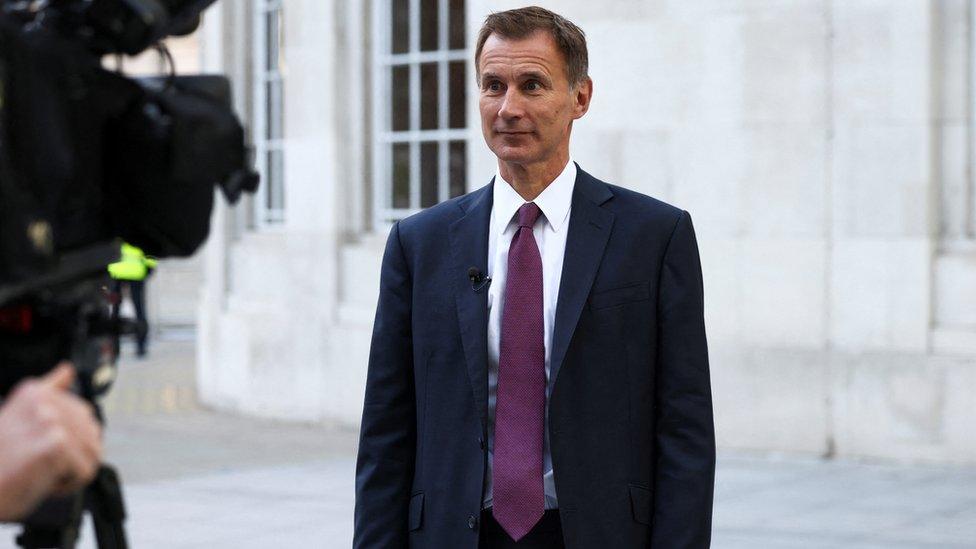Will markets be satisfied with government's plans?
- Published

Jeremy Hunt replaced Kwasi Kwarteng as chancellor following a backlash against the latter's mini-budget
The term "bond market vigilantes" was coined by the American investor Ed Yardeni in the 1980s to describe bond traders who would force the hand of governments and central banks to see the world their way.
The vigilantes are back in force. The markets didn't like Kwasi Kwarteng and Liz Truss's not so mini-budget and its 拢45bn in unfunded tax cuts, and it now lies in tatters.
The largest single measure - a decision to reverse a planned rise in corporation tax costing the treasury 拢18bn - has been dumped.
Taxes on business profits will rise from 19-25% in April and in so doing will consign Ms Truss's dreams of a lower-tax economy to the dustbin for the foreseeable future.
The vigilantes have killed off "Trussonomics", but will they be satisfied or will they want more blood?
As markets closed on Friday, the cost of government borrowing was creeping back up to the level at which the Bank of England stepped in to buy bonds from specialist pension fund managers facing collapse. But the Bank has made clear that its last direct intervention was on Friday.
It also made clear it only stepped in to preserve financial stability.
It is not there to bring government borrowing costs down - quite the opposite in fact - it is committed to raising interest rates to fight inflation. What happens on Monday when the Bank, the biggest bond buyer of the last decade, goes on strike?
Simon French from investment bank Panmure Gordon told the 大象传媒 that installing Jeremy Hunt as chancellor would help and his comments to the media on Saturday morning were sensible.
"There was a touch of the [former chancellor] George Osborne about him, acknowledging that there were tough choices and trade-offs to make on tax and spending.
"He acknowledged the economy we actually have and not the one we wish we had. My sense is they have done enough for now to keep the markets happy."
'Significant hole'
But Mohamed El-Erian, a renowned economist and President of Queens' College, Cambridge, told the 大象传媒 he believed the government had not yet done enough to reassure the financial markets.
He told 大象传媒 Radio 4's Today programme: "They're going to be pushed to find more ways to cover what is still a significant hole in the budget.
"Of the 拢45bn additional unfunded tax cuts that were introduced - in addition to the energy bill - they've now covered about 拢21bn of that, so the market will press them to cover more of that. Hopefully by going back on some other tax cuts, but also possibly through expenditure reduction - but that would go against the growth objective."
But he added that most of the business "damage" sustained since the mini-budget was "recoverable", as long as the government moved "even more forcefully" in trying to restore financial stability - but this would also take "time and luck".
Both the new chancellor and his diminished boss will have their fingers crossed on Monday morning when the vigilantes show up again.